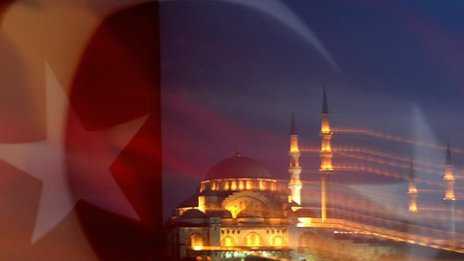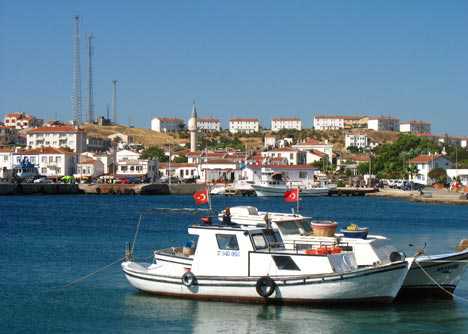By Roger Friedland, in collaboration with his seminar students
One’s sex is never just one’s own. Our sex participates in creation, God’s inestimable gift. Wherever religion seeks to shape social life, sex is always a space of acute concern, a battlefield.
Turkey, like many countries where Islam and blue jeans are both ascendant, is in the midst of a war over its citizens’ sex. The stakes are much more than the conditions of access to pleasure. Manhood, modesty and divinity are all at stake. The struggle, fought most fiercely over the bodies of women, will condition the future of democracy and the way in which popular sovereignty and the revealed law of Allah share the public sphere.
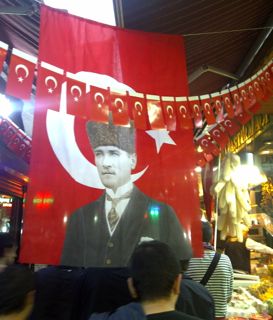
When Kemal Ataturk founded Turkey’s republic in 1923 he sought to expel Islam from the public sphere and promote the liberation of women — their enfranchisement, their schooling and their modern dress. Women were urged to shed their headscarves, men forced to take off their fezes. In the 1980s, in the wake of the Iranian revolution and the rise of Islamism within Turkey, the military came down even harder, refusing admission to schools and universities to any girl who dared cover her head. A woman couldn’t wear a headscarf in parliament, nor for her passport photo. Young women who came to school with them were sometimes taken into closed rooms for reprogramming. Turkey was modern; modesty was not. A headscarf was considered a Trojan horse for Islamism.
And it was. Popular resentment at the state’s heavy-handed regulation of female head covering helped elect Recep Tayyip Erdogan’s conservative Islamic party in 2002. Thousands of religious women of the AKP’s women’s branches went house to house to bring out the vote for the party that promised to respect their piety and their commitment to religious modesty.
The Justice and Development Party, or AK Party, as it is called by its supporters, has now been in power for a decade. The AKP has done, or tried to do, a whole series of things aimed at reducing the opportunities for sin. It has, of course, promoted the use of headscarves for women, enabling them to signal their modesty, both to young men who would approach them, and to other women as the proper way to be in the world. In 2008, the government lifted the university student headscarf ban. (Women professors, on the other hand, still cannot teach with their heads covered.)
That was the least of it. The new government sought to re-criminalize adultery — eliminated as a crime only in 1996 — in order to prevent extra-marital affairs. Some in the party even argued that they re-legalize polygamy to achieve the same end. It reduced the age at which school begins to 5 years old so that when young girls reach puberty they can be sent off to a rapidly growing sector of religious middle schools and avoid daily contact with hormonally charged young boys. It has undercut maternity leaves and employer-provided daycare both to further the promotion of motherhood as the highest feminine ideal and to keep young married women from working in mixed-sex offices and factories. It has encouraged Turkish mothers to aim to have at least three children. It has argued for the abolition of abortion as “murder,” both to promote population growth as a source of national strength and to eliminate the ultimate birth control device for young women who have gone too far. All pregnancies must now be registered with the state. It has shut down health clinics providing contraceptives and family planning information to women. And it has closed down homosexual clubs in major cities like Istanbul.
We can feel the heat of these intimate politics on the streets. I have come here with my NYU Abu Dhabi students as part of a research practicum as we speak with ordinary Turks in their offices and on the streets.
Pious women who now wear their chic, colorful headscarves to school and work, indicating that they are religious and modern, are pleased, they tell us, they can finally be themselves in public life. We meet young scarfed women on the street who tell us how they had to leave high school or could not go to university because they wouldn’t uncover their heads.
While liberal secular feminists have supported religious women’s right to cover their hair, that does not mean they are not ambivalent about it. Barcin Yinanc’s grandmother always wears a headscarf, she explains to us, “not because she believes in political Islam … but because that was the way she was brought up. … Asking my grandmother to take off her headscarf would be equal for you guys to ask me to talk to you naked.”
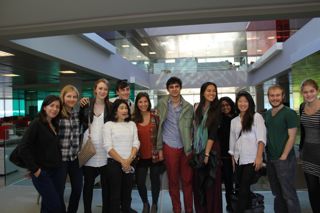
Barcin Yinanc and NYUAD Students at Hurriyet
The vibrant opinion editor at Hurriyet, the Turkish equivalent of the New York Times, still respects her grandmother and her right to cover. But, she continues, “the fact that she was raised like that doesn’t mean that we should go on repeating the same mistake.” Forcing Muslim women to wear a headscarf, she insists, demeans women, reducing them to sexual objects, people whose hair has to be covered to avoid evoking erotic desire in men, desires, it is presumed, they will not be able to control. “If a man sees a piece of hair, he’s going to think sex.” The rise of the headscarf among young women, she complains, is also dividing the country into a covered kind of woman who is assumed to be moral, and the other uncovered kind who is presumed to be available.
“I don’t even care if it’s written in the Quran. … It is not something that is sacred and it should not change. I’m sorry. Everything changes in life, you know, and to me religion can change as well.”
Turkey is a patriarchy, where the differences between men and women are believed to be both etched into their physiology and given by God. Turkey has one of the lowest levels of woman’s empowerment in the world, ranking just above Yemen and Bangladesh. It has the lowest rate of paid female labor force participation in the developed world, hovering under 20 percent. Yet in 2011 Prime Minister Erdogan scrapped the Ministry for Women and Family, dedicated to women’s rights, and made it into the Ministry of Family and Social Policies, at a time when domestic violence against women was soaring.
Ayse Yuksel, who heads the Gender Forum at Sabanci University, crisscrosses Turkey talking to secondary school teachers. She despairs at the women teachers who claim that girls cannot become doctors because they will faint at the sight of blood, and the official world literature textbook that cites 440 male authors but just nine women. She wants girls to be encouraged to aspire to continue learning, to get jobs other than as school teachers and nurses.
Her mission is to teach the teachers about gender, that women are not just natural mothers, but should be able to work at any job. The teachers have never even heard the word, which translates as “social sexuality” in Turkish. “Should men give birth?” one participating teacher asked her. They do not accept that women can do men’s work. Gender, some retort, is a Western importation, “totally foreign.” Her efforts are “against “God’s will.” “We are,” some accuse, “trying to create another sex.”
In Turkey a young woman’s honor is still located between her legs. Forced virginity tests were banned a little more than a decade ago. A school girl or a woman coming home late from work could be taken into custody and forced to comply. Refusal would anyway signal immorality. A Turkish man’s honor is still located in the untouchability, and inviolability, of his women, both his daughters and his wife (or wives in some cases). Still today honor killings are not infrequent. In the rural eastern part of the country, a young woman can be killed or expelled from her family just for hanging around and flirting with an unrelated boy. Families force their daughters who have had sex with somebody to marry them. Fathers sometimes pressure their sons to shoot a sister who has gone too far. For the son to refuse would be considered unmanly. Wives expect to be beaten, if not killed, for an extra-marital affair.
My students fan out on the street with their Turkish peers to talk to people about gender and sexual morality. I have been told that Turks are tight-lipped about such matters. Sex is taboo; this is a country that does not provide any public sexual education for its young citizens. I have told my students to be particularly careful when talking to young women: Do not offend their modesty. Do not, I instruct them, ask any questions about people’s intimate lives. They are to deal in hypotheticals, in generalization, about what people, particularly people like you, think about marriage and morality. They are to be ready for strangers to walk away. It does not work out the way I expect: Almost everybody — both the secular and the pious — wants to talk, to give their opinions, even to tell about their own love lives.
On Istanbul’s streets, many of the young men and women with whom we speak have boy and girlfriends. They hold hands, but they don’t kiss in public. “”Kurdish people don’t kiss each other, there’s no such thing,” declares a head-scarfed girl from one of Turkey’s minority communities, arm in arm with a boy. It would mark them and likely offend the sensibilities of passersby. The young people don’t tell their parents about their relationships, and certainly not the kinds of things they do together when nobody can see. The girls don’t tell their friends either. It is too dangerous: The honor that inheres in virginity still weighs heavily on their personal lives. Only a quarter of all Turkish young people think there is nothing wrong for an unmarried woman to have sexual intercourse with somebody with whom she is in love. One such woman spoke to my students. It is not important for her if a woman is a virgin when she marries, she declares in front of her very affectionate boyfriend. “But it is important to him,” she says, pointing at her suddenly blushing boyfriend. Among the more liberal Istanbulite young people, a gender gap consistently emerges: Many young men who are having sex still want the women they marry to be virgins.
A persistent love story emerges from Istanbul’s streets. My students catch up with a religious couple walking with their two children. We follow traditional Islamic values, they say. They do not, however, intend to arrange their children’s marriages. They want them to fall in love, just like they are. “Nothing is more important than love,” one says. Another young, religious university-educated man in his 20s gushes that love is “the greatest thing in the world.” He knows when he is in love when his “heartbeat gets faster.”
The young people in the cities no longer want their marriages to be arranged. Arranged marriages are essential where unrelated men and women cannot meet, let alone flirt. Religion may divide the city; but love unites it. Young people from the secular and the religious sectors of the city all speak to us of the importance of love as a basis for choosing their mates. They will choose, they say. Their parents will go along. An older man, who migrated to Istanbul from the east some 15 years ago, tells us that his marriage had been arranged. But his children, he says, “should choose their own partners. If they like me, that’s better, but if they don’t, it doesn’t matter.”
Religious men are the most romantically expressive. That religious Turks are seeking love as the basis of marriage is consistent with our seminar’s findings. Analyzing our survey data we found those Turks who were looking to find a pious mate were precisely those most likely to make love important in their mate choices.
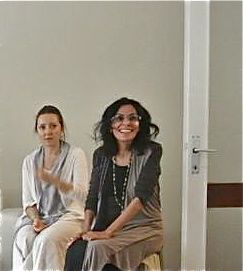
Celmanur Sargut (right) and her translator
When I tell Celmanur Sargut, the celebrated Sufi teacher and thinker, about this, she is not surprised. Turkish Islam is saturated with Sufi influence. Sufism celebrates love, both between humans and God, and between man and wife. Loving another is a step toward loving God. It is through God’s love, what they call ask, a passionate love, that one finds oneself in nothingness and comes to see only love in the other. But real love is not found by looking into the eyes of the beloved. “To walk towards Allah, hand in hand,” she explains, “can be called real love.” But even so sexual relations between husband and wife are saturated with spiritual possibility. Ibn Arabi, she explains to us, declared that a sexual relation — a true one — is a “small sample” of the relation of love between a human being and Allah. It is for this reason, she goes on, that a pious Muslim carries out ablutions after sex. It is not just a purification; it enables one to return to the profane, physical world. In passionate love, one has touched the divine realm.
Romantic love remakes the world. In the history of the West, when love as the basis of marriage emerged in the late 18th and 19th centuries, it empowered women, rendering wife-beating an unthinkable brutality. Love requires freedom, an ability to choose, for the woman as well as the man. It is no accident that romantic love became a basis of marriage in the West in the aftermath of the rise of wage labor which enabled women to earn outside their parents’ control, with the Enlightenment which located the foundation of property in one’s control over one’s body, and against the backdrop of democratic revolutions that made the choice of one’s sovereign an elemental human right. Husbands, like sovereigns, should rule by consent. Love is an unsung, unnoticed part of the liberal heritage, an existential ground for the ethics of choosing.
Private lives have political consequences. The intimate revolution with most political consequence is not sexual, but romantic. Perhaps Turkey’s future — both the rights of women and the democratic accommodation of Islam — hinges not on the freedom of flesh but on the common beating of hearts.
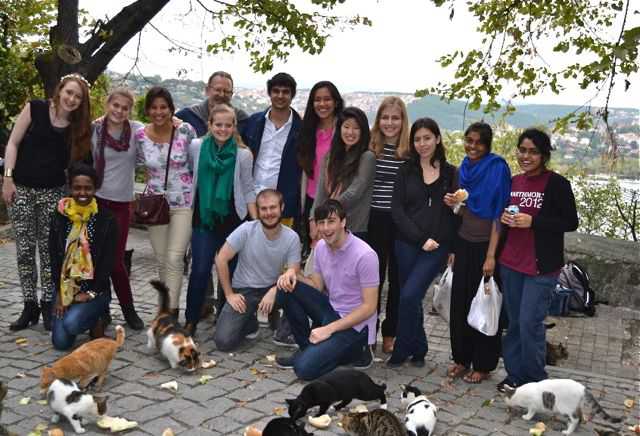
Members of the NYU Abu Dhabi 2012 Research Practicum Seminar: Anishka Arseculeratne, Nino Cricco, Chris Fanikos, Diana Gluck, Caroline Gobena, Joi Lee, Cambria Naslund, Meike Radler, Julia Saubier, James Smoley, Magda Socha, Ramina Sotoudeh, Mastewal Terefe Taddese, Ankhi Thakurta (staff) and Megan Vincent.
Photography by Roger Friedland, Diana Gluck and Julia Saubier.







